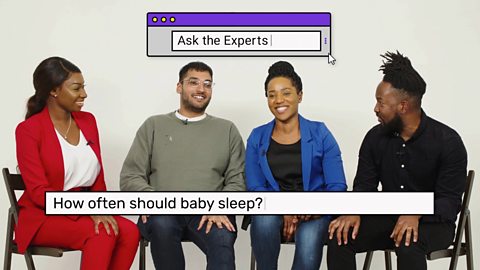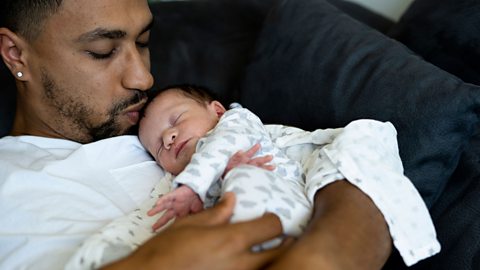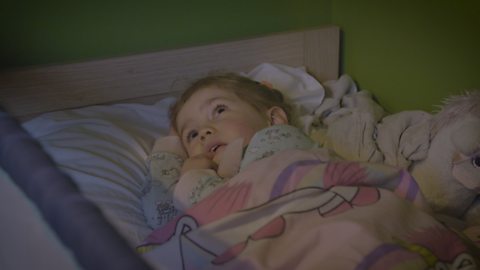Although it might not feel like it when they’re awake at 3am, your baby loves to nap. Many babies sleep for up to 17 hours a day.
But they don’t just switch off when they’re snoozing in their cot or Moses basket – a lot is going on in their growing brains and bodies.
, an expert in the science of sleep and author of Nodding Off: The Science of Sleep from Cradle to Grave, reveals exactly what happens when your baby sleeps…
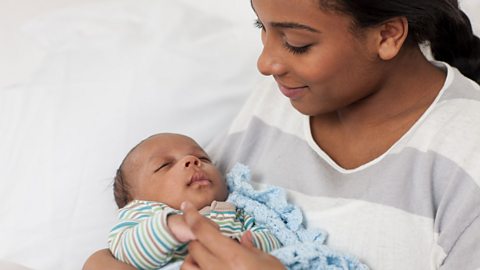
Your newborn is learning even when they’re asleep
From the moment they're born, your baby is learning new things. And incredibly, this could even be happening while they sleep.
In one study from Columbia University in the US, sleeping babies heard a noise and then air was blown into their eyes. They quickly learned to scrunch up their eyelids when they heard the sound… even though they were fast asleep.
Professor Gregory says: “At different stages of life we know there is a link between sleep and learning. This study shows that babies might even be able to learn new information during their sleep; in this case learning to predict when air would be blown into their eyes."
Sleep helps your baby’s memory develop
Wondering why your newborn baby seems to recognise your voice? That’s because the part of their brain responsible for memory is already 40% developed.
And while they sleep, their memory gets another boost. One study found three-month-old babies had a better memory when they napped after learning something new.
In another study, researchers at Washington University found rapid eye movement (REM) sleep plays a big part in forming memories. REM sleep (also known as ‘active’ sleep) is a stage of sleep when our eyes move and most of our dreaming happens. About half of babies’ sleep is in this REM stage, compared to around a quarter for adults.
Professor Gregory says, “There aren’t many studies focused on babies, but it seems that during sleep, our memories are reactivated and moved from the hippocampus (the area of the brain where short-term memories are stored) to parts of the cortex (where longer-term memories are stored).”
Your baby physically grows while they sleep
Research has found babies grow longer while they sleep… up to 9mm in length in just one day!
Professor Gregory says, “We know the release of growth hormone peaks during deep sleep. So it makes sense that there is a link between sleep and growth.”
You can almost predict when you need some bigger baby grows by keeping an eye on your little one’s sleep patterns. In the day or so before a growth spurt, some babies sleep up to four-and-a-half hours more than usual.
According to the same study, every hour of extra sleep your baby has increases the chance of a growth spurt by 20%.
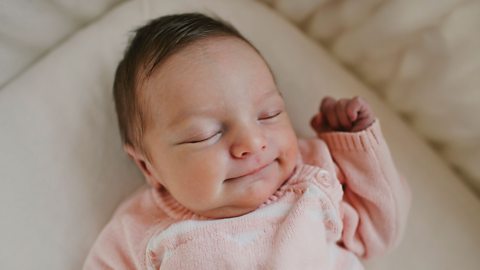
Your baby experiences different emotions when they sleep
Ever seen your baby laugh or smile while they are sleeping? “One function of sleep is to regulate emotions”, says Professor Gregory. “This happens during REM sleep, when our brains process events that have happened in the day and our emotional responses to them.”
And even newborn babies experience these mid-sleep emotions. “Early on in life, babies may also grin during this stage of sleep”, adds Professor Gregory. “This is exciting because they may not have smiled yet when they are awake.”
And these smiles start much earlier than you might think. Using ultrasound, researchers at the University of Durham found that in the womb – when babies are in a state resembling ‘active sleep’ – they sometimes smile and laugh.
Your baby’s language is boosted by sleep
Sleep can even help your baby’s language development. Experts at the University of Oxford say sleep could help babies learn the sounds and meanings of new words. And a 2015 study found 16-month-old babies who napped learned words more easily than babies who didn’t nap.
“This is just another reason why we should always give babies ample opportunities to get the sleep they need”, says Dr Gregory.
Sleep really is important for so many aspects of their development.
Your baby's development affects their sleep
If your baby has reached a milestone like standing up for the first time or learning to crawl, chances are this will impact on their sleep and they could be waking up in the night or not able to drop off. “Following key motor milestones such as learning to sit up or crawl – a baby’s sleep can be disrupted” says Professor Gregory.
“Other developments that might impact on your baby’s sleep include pulling up to stand but not yet knowing how to get back down independently, gaining the ability to throw a pacifier out of their cot, or even learning new words.”

